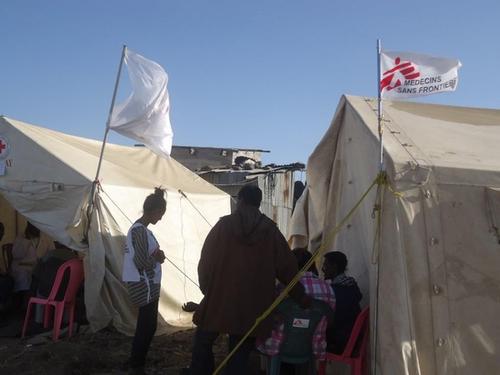Following the decision of the government of the Kingdom of Saudi Arabia to deport ‘illegal’ foreign workers, 154,837 men, women and children have already arrived at Bole Airport in Ethiopia carrying whatever they managed to salvage in sacks, cardboard boxes and suitcases. They are returning home, either by force or voluntarily. All of them have come from the Kingdom of Saudi Arabia (KSA), where they have lived and worked in all manner of jobs, such as domestic workers or nurses. Some were born there while others left Ethiopia when they were very young.
Médecins Sans Frontières (MSF) and other partners have been working in the reception centres since the repatriation of Ethiopians from KSA began in mid-November 2013. Besides providing maternal and child health services, MSF is providing the much-needed psychological help.
Medical assistance on arrival
“Immediate medical attention is vital at these reception points as there are many people that need life-saving medical assistance: some women are going into labour on arrival, while others are in their last trimester of pregnancy with complications that need immediate attention. We are vaccinating unaccompanied minors against measles and polio, offering psychological counselling to men, women and children of all ages, and referring critical cases to various hospitals in Addis Ababa,” reports MSF’s medical coordinator in Ethiopia, Dr Jean François Saint-Sauveur.
In the past four weeks alone, MSF medical teams have conducted 160 maternal and child health consultations, 91 paediatric consultations and offered group and individual psychosocial counselling sessions to more than 18,128 patients.
Abuse at the hands of traffickers
Sambera*, a 22-year-old man reached Saudi Arabia after suffering abuse by different people including traffickers in Yemen. MSF is also providing medical assistance to migrants in detention centres in Yemen, most of whom are Ethiopians. He was detained at the Yemeni border, where he managed to bribe his way into Saudi Arabia. “Even after my arrival to Saudi Arabia, I did not get the opportunity to work and earn money to help my poor family in Ethiopia; instead, I was imprisoned, beaten up, and then deported back home,” says Sambera.
He and many others like 15-year-old Yelem* have been undergoing individual counselling sessions offered by MSF. On arrival, Yelem was totally confused, aggressive, disoriented, talking to herself and smiling occasionally but then after a minute crying bitterly. She mentioned how she had worked in different households without pay and how her employers had physically abused her. She went to Saudi Arabia when she was only 10 years old. Now at age 15, she is lost and confused, MSF psychologists referred her to the Emanuel Hospital to obtain specialised medical and psychological treatment.
Psychosocial counselling
“Most of the returnees that we are attending are suffering from major depression, post-traumatic stress disorders (PTSD), acute stress, generalised anxiety, dissociative and psychotic syndromes,” says Angelica Kokutona Wagwa, MSF’s psychologist in Ethiopia. “Most of the returnees are aged between 18 and 36 years and there is a need therefore to give them hope for the future by ensuring that they continue to receive psychosocial counselling to help them resettle well in their communities,” she adds.
Most of the returnees have sad stories to tell. MSF, together with other partners like IOM (International Organization for Migration) and the Ethiopian authorities, continues to offer assistance to this vulnerable group of people to improve their situation until they are reunited with their families.
*Not their real names. Names have been changed to protect our patients..
MSF has worked in Ethiopia continually since 1984, carrying out a variety of medical and nutritional interventions throughout the country



